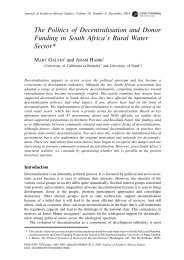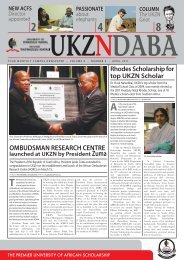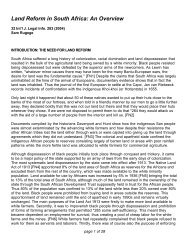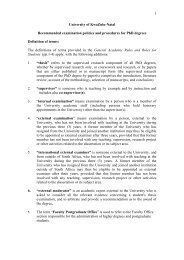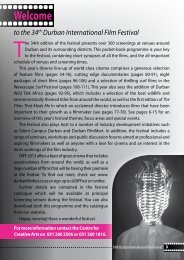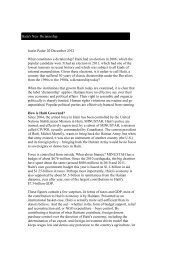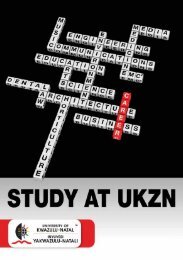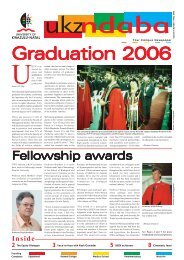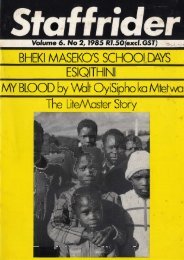Staffrider Vol.3 No.4 Dec-Jan 1980 - DISA
Staffrider Vol.3 No.4 Dec-Jan 1980 - DISA
Staffrider Vol.3 No.4 Dec-Jan 1980 - DISA
Create successful ePaper yourself
Turn your PDF publications into a flip-book with our unique Google optimized e-Paper software.
4 ln <strong>1980</strong>, Reggae f >returned to Africa,where its deepestroots lie.'where its deepest roots lie. Bob Marie)and the Wallers performed at theZimbabwe Independence Day celebrationsat Rufaro stadium before thousandsof jubilant Zimbabweans. Theprophecy was fulfilled, redemption atlast.Another reggae master, Jimmy Cliff,completed a controversial tour of SouthAfrica earlier this year. (Marley refusesto set foot in South Africa until discriminationis wiped out.) Cliff was instrumentalin breaking reggae music to theworld with his role as Ivan O. Martin inthe film 'The Harder They Come' whichdocuments Jamaican street life and thearchetypal struggle of the rude-boy toget his songs on the hit parade and thusclimb out of the ghetto. The film endswhen Ivan falls foul of the law, isbetrayed by his friends, tries to jump afreighter to Cuba, misses the boat anddies laughing at the wrong end of apolice gun. In real life Cliff left Jamaicato live in England and became a Muslim.Regarded as something of an outsider heis nevertheless a reggae musician of greatimportance.Burning Spear do not sing of love orsex. They are a political, Rasta propagandamachine. The name is taken fromthe Burning Spear of Kenya, JomoKenyatta. Spear are a vital part of thereggae landscape and Winston Rodney isarguably the definitive reggae singer.Cry blood cry AfricaNo more invasionNo more black blood na go run innariver JordanCry blood cry AfricaFree Africa cry blood . . .— Burning SpearDUB MUSICDUB is roots music, a kind of submarineform of reggae. It burned in themarket places, the streets, the bloosdances.Deejays with princely namesoperated their sound systems right intothe crowd — the latest soul disc fromAmerica or a local reggae band. To getthe edge over his competitors, or just towhip up some enthusiasm, the on-thespotjockey started jive-talking, shrieking,stirring up the atmosphere — pushinghis system's output to greaterheights.The art of deejaying extended intothe studio where the vocals on a recordwould be rubbed out and a 'jay' wouldpunctuate the pre-recorded rhythm withJ ^8Jimmy Cliff photo, Biddy Crewehis own vocal interpretation. Dub isdriven by a heavy bass sound so thepeople on the street could not miss thebeat. The best deejays are I and IRastafarians, preaching Jah love and J ahculture. U. Roy, Big Youth andDillinger are dub prophets.JAH RHYTHMS IN ENGLANDEngland is a bitch . . .— Linton Kwesi JohnsonJah rhythms reached England via theWest Indian immigrants. Reggae burnsin the tenement houses of Brixton asthe brethren search for work and meetthe British workless head-on. Racism isnot law but is often felt to exist. Englandis the heart of a giant rock-musicindustry and reggae music was verystrange at first. The influence of theblack men from the West Indies on theEnglish culture was strongest on themusic front.The first kids to pick up on the offbeatsof reggae were the skinheads, thebad boys who had a strong affinity withthe Jamaican rude-boy, the ethos ofwhich is an essential element in reggae.From there it took off and reggaecarved inroads into the rock corporatemachine and into the minds of adespairing nation.Off-beats ruled by the end of theseventies. Bob Marley was completing atriumphant tour of Europe and England,supported on all concerts by anEnglish pure reggae band, Steel Pulse.Peter Tosh was scorching at the Rainbowin London to a swaying crowd ofWest Indian and English fans, smokinggiant spliffs shoulder to shoulder. 'Nomatter where you come from as long asyou're a black man you're an African'sang Tosh with locks flying, shaking alarge finger at the spellbound multitude,stalking panther-like down the stagefront,dagger in his waistband and a pairof handcuffs hanging uselessly from onewrist.In Brixton, a poor area in SouthLondon, a Jamaican immigrant andRastafarian without locks, Linton KwesiJohnson, was chanting the ancient•rhythms of dub and getting heard.And when reggae fused with punkrock it turned into a form of ska revival— fast skanking off-beats, a mutationthat draws heavily on reggae roots,African roots. The saxophone licks belongin the jazz traditions of the townships— as the toasting belongs in aKingston sound-system. The raw guitarbelongs in the hands of the punk. Notonly is the music a mixture of styles butthe musicians are a mixture of races.Nothing new, but significant becausethe two-tone bands present a unifiedfront, soul front, at a time when theevils of racism are rampant close tohome.JAMAICAN CONSERVATIVESA landslide victory for the new conservativegovernment in Jamaica's recentelection could set back the Rastafaricultural movement on the island.The new Prime Minister, Mr EdwardSeage, is unlikely to look kindly uponthe anti-establishment anti-capitalistphilosophies of the brethren, and theirganja-smoking rituals will cause alarm.These policies are in contrast toformer Prime Minister Michael Manley'sinterest and support for the rastarnen.Manley's socialism and connectionwith Cuba have also been reversed bySeaga who is encouraging foreigninvestment and has already ended theCuban influence.But the conservatives will draw thefire of reggae musicians who havealready infiltrated the world with theirrhythms, and they won't like that.Shake dem locks and a weak heartdrop.STOP PRESSBOBMARLEYMAYHAVECANCER.At the time of going to press ithad been reported that BobMarley was critically ill, possiblywith cancer. His London concerthad been cancelled and hismillions of fans the world overwait for news of his condition.STAFFRIHFRnPfPMRPR 1 980/IANUARY 1 Oc1




